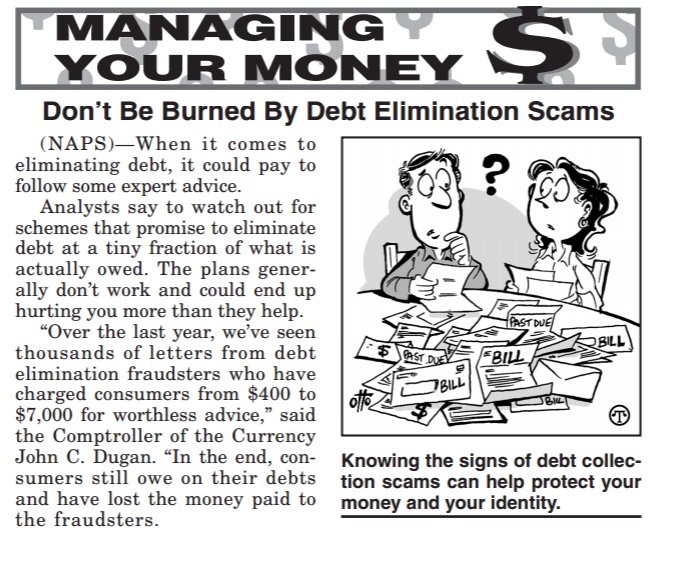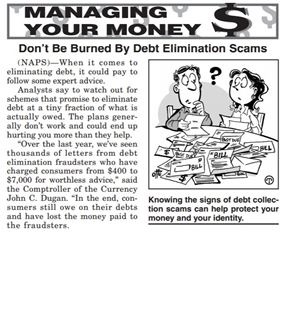OCC WARNING ON DEBT ELIMINATION SCAMS
OCC Debt Elimination Notice
https://www.occ.gov/news-issuances/psa/dont-be-burned-by-debt-elimination-scams-feature.pdf
The Office of the Comptroller of the Currency (“OCC”) continues to see an increasing volume and variety of fictitious debt elimination schemes being perpetrated against financial institutions. These fictitious schemes are not to be confused with debt consolidation or debt workout programs presented by legitimate entities.
The object of legitimate programs is to assist the borrower to repay the debt in a responsible manner. The fictitious schemes claim to be able to “eliminate” or to “cancel” various types of debt from banks and non-banks without a material further amount of payment by the obligor. The fictitious schemes take various forms, including those that:
- claim to pay out the debt in some way, but don’t;
- transfer the debt to some wealthy benevolent entity, that does not exist or has no financial capacity; or,
- falsely claim to be able to have the debt declared invalid for the reason that the financial company is not permitted to lend money or the documentation used by the lender is not valid.
The fictitious, fraudulent schemes are being marketed to everybody, not just the wealthy or sophisticated, including borrowers who are current and those approaching foreclosure. The underlying fraudulent claim in all these fictitious schemes is:
- a debt can be eliminated or canceled simply by paying someone a small fee relative to the amount of debt to be eliminated.
These schemes are promoted: via the Internet; in seminars throughout the United States; and, directly by persons known to the victim by way of group affiliation, particularly religious and fraternal groups. These fraudulent schemes claim to “eliminate” or to “cancel” various types of debt, including mortgages, credit card balances, student loans, auto loans, and small business loans. All of them are simply designed to take an individual’s money, and are just the modern version of the old “up-front-fee” scheme. The schemes charge an up-front fee, or membership fee, that currently ranges from $400 to $7,500.

As a result of using a fraudulent scheme, individuals will lose money, could lose property, will damage their credit rating, and possibly incur additional debt. In addition, a creditor may take legal action against an individual to resolve a fraudulent attempt to eliminate debt. It is also possible for the victim to have identity theft occur by participating in a fraudulent scheme. The perpetrators of these schemes are known to steal identities and create substantial new debts in the victim’s name before they are even aware that it has occurred. It is extremely difficult and time-consuming to resolve the issues pertaining to identity theft.
These fraudulent debt elimination and cancellation schemes have no substance in law or finance. In statements and sometimes in the guise of education, the perpetrators of the schemes provide inaccurate or distorted information about applicable laws and real financial operations. The following are examples of inaccurate information the OCC has seen from these schemes:
- Secret information or laws, known only to a select few, can be used to eliminate debt;
- Banks and other creditors do not have the authority to lend money, to advance credit, or to charge interest;
- An individual’s debt is a asset of the creditor that the creditor owes to the individual;
- A debt owed to a bank is the same as a deposit in a bank;
- Creditors will not pursue debt collection after an individual participates in one of these schemes;
- The United States Department of Treasury or some other Federal agency establishes a trust account when an individual is born;
- Arbitration need not meet the terms of the credit agreement;
- Individuals can create their own arbitration companies that can create and certify arbitration awards that eliminate, cancel or reduce debt;
- An individual does not have to pay the debt because the contract or note is illegal and may even deserve a compensatory award; and,
- Results are guaranteed.
There are unlimited variations to these schemes. The basic idea of these schemes, however, is to fool individuals into paying money to have a debt eliminated or cancelled, or to obtain false documents and the instructions on how to submit the false documents to creditors. The following are some variations of the false documents used:
- A fake arbitration award from an arbitrator not authorized under the debt agreement;
- A worthless debt instrument issued by some company, group, trust, benevolent society, or wealthy individual, quite often of foreign origin, as a substitute for the creditor’s note;
- A record of a fictitious account or “trust account” supposedly held in an individual’s name at the United States Department of the Treasury or other Federal agency;
- A fictitious U. S. Government debt instrument issued as a substitute for the creditor’s note, payable through an agency or by an authorized agency person;
- A notice, usually voluminous, to the creditor stating that the contract or note is illegal or the creditor does not have authority to “advance credit” and has violated the law; or,
- The issuance of a false payoff certificate from the original lender, combined with the borrower’s authorization for the perpetrator to obtain a new mortgage, using the proceeds to pay the perpetrator’s fee. This “new debt” is stated to be a new first lien, but it is really just a second mortgage, thereby increasing the victim’s debt and monthly payment requirements.
Any information that you have concerning fraudulent debt elimination or debt cancellation schemes should be brought to the attention of appropriate local or Federal law enforcement personnel.
If the fraudulent scheme is presented via the Internet or e-mail, contact the Internet Crime Complaint Center (IC3). Please go to the IC3 Web site at http://www.ic3.gov and follow the instructions for filing a complaint (IC3 was f/n/a the Internet Fraud Complaint Center- IFCC). Contacts from other sources, such as individual contacts or seminars, should be reported to the local office of the FBI and your local financial fraud law enforcement organization.
If any portion of the offering or subsequent portions of the transaction are processed through the United States Postal System (USPS), the Criminal Investigation Division of the USPS should be contacted. Contact information can be obtained from your local U.S. Post Office.




